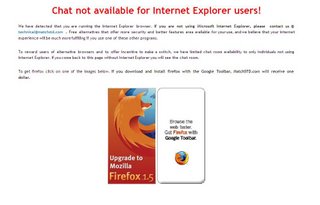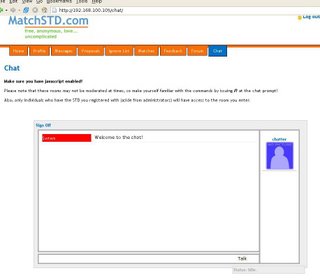Tidbits @ Kassemi
A collection of opinions, thoughts, tricks and misc. information.Thursday, June 22, 2006
Killing Internet Explorer
Ah. You're in vim (unarguably the best editor of all time) designing your latest web masterpiece. You're constantly switching between your editor and the Firefox window you've got open hitting "refresh" endlessly. Your fingers are stiff, your eyes dry and scratchy, your Mountain Dew 2-Liter nearly through, and you're almost done. It's absolutely beautiful. Perfect... Your client's going to want to spend those big bucks now, and this is a great piece to add to your portfolio. You've just got to open up IE, and BAM! Your CSS float didn't display as it should have and you're going to have to spend another hour editing your design to make it work... Wouldn't it be MUCH simpler to just say screw everybody who didn't have the correct browser? The answer is yes. It would. And that's what I'm going to suggest you do.
Case in point. MatchSTD.com, my latest project. Chat room access is only provided to individuals who are using a browser OTHER than Internet Explorer. If you're browsing with Internet Explorer you can get every page on the site, except the chat room:

Any other browser (Firefox, here):

Users are informed why Internet Explorer is bad for them, and then are forced to download and use another browser if they want access to the page. It's worked well so far. The majority of users will either download install and launch a new browser, or simply switch to an already installed Firefox and access the page. The problem with this? They'll switch right back to IE because there's no reason, except when browsing this specific site, that they'd want to use Firefox instead. A normal computer user isn't going to have concerns over spyware, viruses, print-abort-proc remote code injection vulnerabilities, and the like. They'll care whether or not they can do what they aimed to do when the logged on. So why is IE not threatened by Firefox? Because we're supporting them fully. So how do we go about doing this?
- Examine your site by feature
Take a look at your site. List every specific, independent feature that you've programmed. Find a feature that's useful, fun, and not necessary for site function.
- Block Internet Explorer User-Agent Headers Access
If the user agent contains MSIE. Stop it.
You're thinking, "But James, that's really easy to spoof. I change it all the time to try to access IE-only sites!" And you are absolutely right. We're not attempting to convert users who have demonstrated such motivation, we're trying to convert the masses... And let's face it, the majority of the audience for most sites will follow the instructions that are in front of them because no desire to research instructions on something they don't even know how to google for.
The most important thing about this is that you're not blocking users from your site. You are just visibly making their internet experience more pleasurable, as they will do for you by using another browser. Make sure you provide different links for getting firefox. Try spreadfirefox.com for images and ideas. Join their affiliate program and watch your conversions grow :)
- Let others know
If other webmasters begin using this technique, users will be less inclined to switch back to Internet Explorer after they're done on your page. And it doesn't take the participation of a big site! A typical user will visit hundreds (perhaps thousands) of pages while browsing the internet. If a larger number of sites that offer Non-IE only content in relation to the number of sites that block users not using IE exist on the internet, users will be forced to switch from Firefox to Internet Explorer, generating a dislike for the latter.
If you don't have a website of your own, start making requests to other sites to block sections of content from users on Internet Explorer. Explain to them the benefits. As previously stated, It doesn't take the participation of larger sites, simply the participation of many smaller ones. Spread the word, and maybe we can start living easier without IE!
Take it easy, and thank you!
James Kassemi
james at tweekedideas dot com
james at matchstd dot com
505-991-0973
<< Home
Archives
August 2005 September 2005 October 2005 November 2005 December 2005 January 2006 February 2006 March 2006 April 2006 June 2006 July 2006 August 2006 September 2006 October 2006 November 2006
